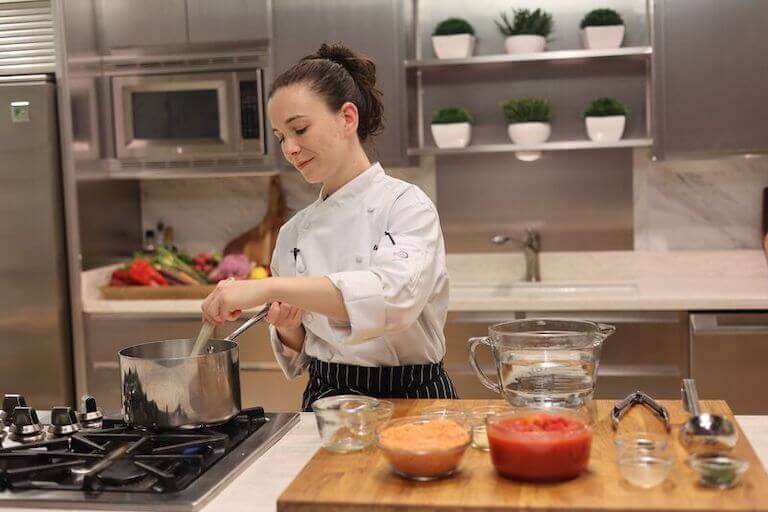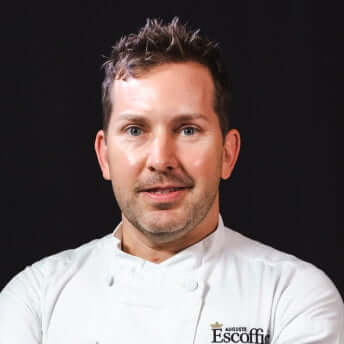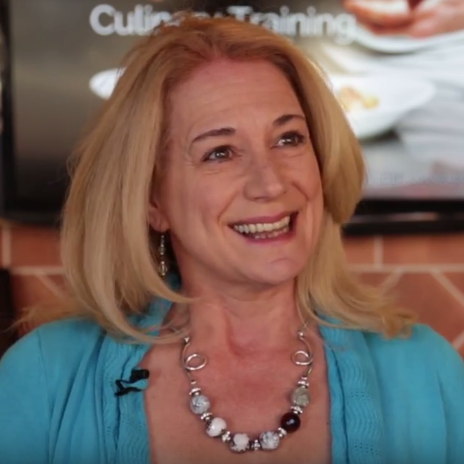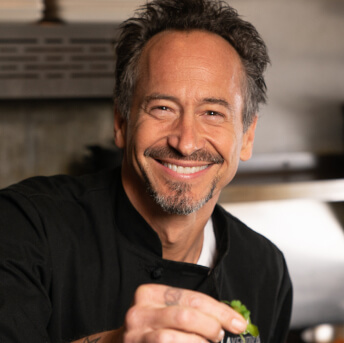Whether you’re fresh out of college, itching to switch careers after 20 years, or are looking to enter the civilian workforce after military service, choosing a career can be difficult.
Even if you know you want to work in food, you still have hundreds of different careers to choose from. You can develop menus and oversee others as a chef, utilize your artistic talents and love of sugar as a cake decorator, capture a dish’s beauty as a food photographer…the list goes on!
If you’re wondering how to choose a career from the long list of options, you’re not alone. We’ll introduce you to some tips to help you determine which culinary career could be right for you.
1. Consider Your Strengths
Think back to your childhood. Perhaps you garnered attention as you filled a notebook with stunning colored pencil sketches or made discoveries of colored rocks and bird feathers in your backyard. And maybe you naturally commanded attention on the playground, helped smooth out arguments between friends, or made the new kid feel welcome.
Choosing a career that matches your natural talents will not only increase the chances you’ll excel at your career, but you may also find it leads to greater self-confidence.
If you’re naturally creative, you may enjoy working as a wedding cake designer or food stylist. And if you find you have a passion for helping others feel welcomed and understood, you may be well-suited to a career as a hotel manager or health coach.
But even though it can be a smart choice to choose a career based on your strengths, it’s also a good idea to become well-rounded! Students in Culinary Arts and Baking & Pastry Arts programs can explore the science behind techniques, different methods of cooking and baking, the business side of things, and more.
“I was so focused on the technique and the creation. But you really need to have a strong set of skills on the administrative side of owning and running your own business. You just want to make cakes, but you can’t until you’ve done all these other steps—bills, ordering equipment, having a kitchen plan to submit to the health department. You have to be a very well-balanced person.”*
Steve Konopelski, Chef Instructor
2. Think About What You Liked (and Disliked) About Previous Careers
If you’re planning on switching careers, chances are that you’re not happy with some component of your current job. Perhaps you find yourself constantly watching the clock as you wait for another tedious day to end. Or maybe you dislike second-shift hours that prevent you from spending time with your family. Before you jump into a new career, take a moment to think about why you want to leave your current job, as well as what you liked and disliked about jobs you’ve held in the past.
While it may be tempting to focus on the negative aspects of the job you’re longing to leave behind, you should also take a moment to consider how it fits into your ideal life. Does its schedule offer you time to pursue activities you enjoy? Are you excited by the opportunities for growth and advancement?

If you love the business side of careers, you may want to consider a career in food entrepreneurship.
Once you’ve made lists of what you like and don’t like about your current job, come up with a list of items you’d like for your new career to offer and a list of things you’d like to avoid.
For example, if you found you’d like to avoid spending all day at a desk but want to utilize your talents for creating and capturing beauty, you may thrive as a food photographer or food stylist.
Hear About Others’ Paths to Their Culinary Careers
When it comes to choosing a career and taking the first steps down this new path, it can be helpful to hear stories from others who once stood in your place. On The Ultimate Dish, we talk to culinary professionals ranging from chefs to entrepreneurs to health coaches. While it may seem like these people have their careers figured out, they also started out as newbies in their chosen fields.
Give these episodes a listen (or read) to encourage you as you begin your culinary journey.
- Entrepreneur Josh Sharky Builds Game-Changing Recipe Software for Culinary Pros
- You Are the CEO of You with Kareen “Chef Coco” Linton
- How to Write Books About Food, Cocktails, and More: Chef and Food Historian Albert Schmid Shares His Secrets
- Daryl Shular: Starting at the Bottom, Becoming a Master Chef
- Culinary Research & Development as a Career with Chris McAdams
- Making a Family Wine Business a Success: Palmaz Vineyards CEO Florencia Palmaz Tells All
3. Be Honest About Your Financial Needs
Working in a field you’re passionate about can help you lead a fulfilling life. But even if you love piping intricate roses that make brides beam, financial insecurity can still create stress that eats away at the joy your work creates.
While some culinary careers undoubtedly pay more than others, there’s also a wide range in salaries within specific culinary fields. For example, while line cooks at fast-casual restaurants and sous chefs at fine dining establishments may both spend their evenings cooking medium-rare steaks, the latter is likely to pay more.
Experience lets employers see both your dedication to the craft and the skills you already possess, which may help put you on the fast track to a higher-paying career. While working your way up through the ranks in a kitchen, bakery, or hotel can be one way to obtain a job that meets your financial needs, advancing your skills in culinary school is another option.
“[Escoffier graduates] self-initiative—and their passion for providing quality food to our customers—allows us to put them into a leadership role very quickly.”*
Mary Ann Mathieu, Executive Recruiter at Sodexo
Attending culinary school not only can provide you with the opportunity to practice new skills you might not get to learn on the job, but it also can allow you to learn from a variety of talented Chef Instructors, network with other culinary school students, and gain experience in highly-rated kitchens during a culinary externship.
4. Think About Short-Term and Long-Term Goals
It can be easy to jump into a career with only your short-term goals in mind. But if you forgo thinking about where you want to be in five or ten years, you may find yourself seeking another career change down the line.
For example, while your short-term goals may involve spending more of your life interacting with food, your long-term goals may involve leading a team of others, having a flexible schedule, or opening your own restaurant.
Establishing these long-term goals can help you choose a career that matches both your current and future needs. And it can also help you choose an educational program that can help you develop the know-how and skills you need! For example, if you’re interested in establishing your own bakery or catering business, you may find a Food Entrepreneurship program helpful. And if you dream of running the kitchen at a plant-based restaurant, consider enrolling in a Plant-Based Culinary Arts program.
5. Consider Your Social Needs
Working alone, and with others, can have a big impact on how much you enjoy your job. While some people thrive working in team environments and interacting with the public, others prefer to work alone. And even if you love talking with others, you may find an active social life outside of work drains all your social energy and pushes you towards solo work.

Do you prefer working with others or solo?
Fortunately, you can find careers in food that allow you to work solo and other careers that allow you to work with people. You may also find that even if you’re working with others, you may not be exerting lots of social energy. For example, while a kitchen is often full of line cooks, sous chefs, garde-mangers, and more, individuals often remain quietly focused on the task at hand. And while professionals like wedding cake designers and food photographers may spend a large portion of their time working alone, they also need to regularly communicate with clients both in-person and over the phone and computer.
“Are you doing it because it matters to you, or are you doing it because you think you’re supposed to? I always say, “Who could you be if you weren’t who you thought you were?” Everyone has an image of what they’re trying to be, but who is the real you?”*
Jeffrey Saad, Celebrity Chef
Begin Your New Culinary Career
With these tips in mind, you now have some new elements to mull over as you consider how to choose a career in food. Rather than rush into something new, spend some time thinking about your wants and needs, talking to those close to you, and reaching out to others for advice.
When the time comes to take the next step toward your new career, consider pursuing a culinary education. In addition to traditional culinary school programs offered online and on-campus, you might explore pastry school, plant-based culinary school, holistic nutrition & wellness, food entrepreneurship, and hospitality & restaurant operations management. In other words, you have lots of options to choose from! And with so many programs available online, it can make it easier to fit your education into the rest of your life.
If you aren’t sure which program is right for you and your career goals, reach out to our admissions staff for help.
To learn more about culinary careers, check these out next:
- What Training Do You Need for a Career in the Hospitality Industry?
- 10 Common Interview Questions for a Chef Position
- 5 Alternative Careers Out of Culinary School
*Information may not reflect every student’s experience. Results and outcomes may be based on several factors, such as geographical region or previous experience.

 “I was so focused on the technique and the creation. But you really need to have a strong set of skills on the administrative side of owning and running your own business. You just want to make cakes, but you can’t until you’ve done all these other steps—bills, ordering equipment, having a kitchen plan to submit to the health department. You have to be a very well-balanced person.”*
“I was so focused on the technique and the creation. But you really need to have a strong set of skills on the administrative side of owning and running your own business. You just want to make cakes, but you can’t until you’ve done all these other steps—bills, ordering equipment, having a kitchen plan to submit to the health department. You have to be a very well-balanced person.”* “[Escoffier graduates] self-initiative—and their passion for providing quality food to our customers—allows us to put them into a leadership role very quickly.”*
“[Escoffier graduates] self-initiative—and their passion for providing quality food to our customers—allows us to put them into a leadership role very quickly.”* “Are you doing it because it matters to you, or are you doing it because you think you’re supposed to? I always say, “Who could you be if you weren’t who you thought you were?” Everyone has an image of what they’re trying to be, but who is the real you?”*
“Are you doing it because it matters to you, or are you doing it because you think you’re supposed to? I always say, “Who could you be if you weren’t who you thought you were?” Everyone has an image of what they’re trying to be, but who is the real you?”*